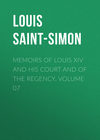Czytaj książkę: «Memoirs of Louis XIV and His Court and of the Regency. Volume 10», strona 3
On Wednesday, the 21st of August, four physicians saw the King, but took care to do nothing except praise Fagon, who gave him cassia. For some days it had been perceived that he ate meat and even bread with difficulty, (though all his life he had eaten but little of the latter, and for some time only the crumb, because he had no teeth). Soup in larger quantity, hash very light, and eggs compensated him; but he ate very sparingly.
On Thursday, the 22nd of August, the King was still worse. He saw four other physicians, who, like the first four, did nothing but admire the learned and admirable treatment of Fagon, who made him take towards evening some Jesuit bark and water and intended to give him at night, ass's milk. This same day, the King ordered the Duc de la Rochefoucauld to bring him his clothes on the morrow, in order that he might choose which he would wear upon leaving off the mourning he wore for a son of Madame la Duchesse de Lorraine. He had not been able to quit his chamber for some days; he could scarcely eat anything solid; his physician slept in his chamber, and yet he reckoned upon being cured, upon dressing himself again, and wished to choose his dress! In like manner there was the same round of councils, of work, of amusements. So true it is, that men do not wish to die, and dissimulate from themselves the approach of death as long as possible. Meanwhile, let me say, that the state of the King, which nobody was ignorant of, had already changed M. d'Orleans' desert into a crowded city.
Friday, the 23rd of August, the night was as usual, the morning also. The King worked with Pere Tellier, who tried, but in vain, to make him fill up several benefices that were vacant; that is to say, Pere Tellier wished to dispose of them himself, instead of leaving them to M. le Duc d'Orleans. Let me state at once, that the feebler the King grew the more Pere Tellier worried him; so as not to lose such a rich prey, or miss the opportunity of securing fresh creatures for his service. But he could not succeed. The King declared to him that he had enough to render account of to God, without charging himself with this nomination, and forbade him to speak again upon the subject.
On Saturday evening, the 24th of August, he supped in his dressing-gown, in presence of the courtiers, for the last time. I noticed that he could only swallow liquids, and that he was troubled if looked at. He could not finish his supper, and begged the courtiers to pass on, that is to say, go away. He went to bed, where his leg, on which were several black marks, was examined. It had grown worse lately and had given him much pain. He sent for Pere Tellier and made confession. Confusion spread among the doctors at this. Milk, and Jesuit bark and water had been tried and abandoned in turns; now, nobody knew what to try. The doctors admitted that they believed he had had a slow fever ever since Whitsuntide; and excused themselves for doing nothing on the ground that he did not wish for remedies.
On Sunday, the 25th of August, no more mystery was made of the King's danger. Nevertheless, he expressly commanded that nothing should be changed in the usual order of this day (the fete of St. Louis), that is to say, that the drums and the hautboys, assembled beneath his windows, should play their accustomed music as soon as he awoke, and that the twenty-four violins should play in the ante-chamber during his dinner. He worked afterwards with the Chancellor, who wrote, under his dictation, a codicil to his will, Madame de Maintenon being present. She and M. du Maine, who thought incessantly of themselves, did not consider the King had done enough for them by his will; they wished to remedy this by a codicil, which equally showed how enormously they abused the King's weakness in this extremity, and to what an excess ambition may carry us. By this codicil the King submitted all the civil and military household of the young King to the Duc du Maine, and under his orders to Marechal de Villeroy, who, by this disposition became the sole masters of the person and the dwelling place of the King, and of Paris, by the troops placed in their hands; so that the Regent had not the slightest shadow of authority and was at their mercy; certainly liable to be arrested or worse, any time it should please M. du Maine.
Soon after the Chancellor left the King, Madame de Maintenon, who remained, sent for the ladies; and the musicians came at seven o'clock in the evening. But the King fell asleep during the conversation of the ladies. He awoke; his brain confused, which frightened them and made them call the doctors. They found his pulse so bad that they did not hesitate to propose to him, his senses having returned, to take the sacrament without delay. Pere Tellier was sent for; the musicians who had just prepared their books and their instruments, were dismissed, the ladies also; and in a quarter of an hour from that time, the King made confession to Pere Tellier, the Cardinal de Rohan, meanwhile, bringing the Holy Sacrament from the chapel, and sending for the Cure and holy oils. Two of the King's chaplains, summoned by the Cardinal, came, and seven or eight candlesticks were carried by valets. The Cardinal said a word or two to the King upon this great and last action, during which the King appeared very firm, but very penetrated with what he was doing. As soon as he had received Our Saviour and the holy oils, everybody left the chamber except Madame de Maintenon and the Chancellor. Immediately afterwards, and this was rather strange, a kind of book or little tablet was placed upon the bed, the codicil was presented to the King, and at the bottom of it he wrote four or five lines, and restored the document to the Chancellor.
After this, the King sent for M. le Duc d'Orleans, showed him much esteem, friendship, and confidence; but what is terrible with Jesus Christ still upon his lips—the Sacrament he had just received—he assured him, he would find nothing in his will with which he would not feel pleased. Then he recommended to him the state and the person of the future King.
On Monday, the 26th of August, the King called to him the Cardinals de Rohan and de Bissy, protested that he died in the faith, and in submission to the Church, then added, looking at them, that he was sorry to leave the affairs of the Church as they were; that they knew he had done nothing except what they wished; that it was therefore for them to answer before God for what he had done; that his own conscience was clear, and that he was as an ignorant man who had abandoned himself entirely to them. What a frightful thunderbolt was this to the two Cardinals; for this was an allusion to the terrible constitution they had assisted Pere Tellier in forcing upon him. But their calm was superior to all trial. They praised him and said he had done well, and that he might be at ease as to the result.
This same Monday, 26th of August, after the two Cardinals had left the room, the King dined in his bed in the presence of those who were privileged to enter. As the things were being cleared away, he made them approach and addressed to them these words, which were stored up in their memory:—"Gentlemen, I ask your pardon for the bad example I have given you. I have much to thank you for the manner in which you have served me, and for the attachment and fidelity you have always shown for me. I am very sorry I have not done for you all I should have wished to do; bad times have been the cause. I ask for my grandson the same application and the same fidelity you have had for me. He is a child who may experience many reverses. Let your example be one for all my other subjects. Follow the orders my nephew will give you; he is to govern the realm; I hope he will govern it well; I hope also that you will all contribute to keep up union, and that if any one falls away you will aid in bringing him back. I feel that I am moved, and that I move you also. I ask your pardon. Adieu, gentlemen, I hope you will sometimes remember me."
A short time after he called the Marechal de Villeroy to him, and said he had made him governor of the Dauphin. He then called to him M. le Duc and M. le Prince de Conti, and recommended to them the advantage of union among princes. Then, hearing women in the cabinet, questioned who were there, and immediately sent word they might enter. Madame la Duchesse de Berry, Madame la Duchesse d'Orleans, and the Princesses of the blood forthwith appeared, crying. The King told them they must not cry thus, and said a few friendly words to them, and dismissed them. They retired by the cabinet, weeping and crying very loudly, which caused people to believe outside that the King was dead; and, indeed, the rumour spread to Paris, and even to the provinces.
Some time after the King requested the Duchesse de Ventadour to bring the little Dauphin to him. He made the child approach, and then said to him, before Madame de Maintenon and the few privileged people present, "My child, you are going to be a great king; do not imitate me in the taste I have had for building, or in that I have had for war; try, on the contrary, to be at peace with your neighbours. Render to God what you owe Him; recognise the obligations you are under to Him; make Him honoured by your subjects. Always follow good counsels; try to comfort your people, which I unhappily have not done. Never forget the obligation you owe to Madame de Ventadour. Madame (addressing her), let me embrace him (and while embracing him), my dear child, I give you my benediction with my whole heart."
As the little Prince was about to be taken off the bed, the King redemanded him, embraced him again, and raising hands and eyes to Heaven, blessed him once more. This spectacle was extremely touching.
On Tuesday, the 27th of August, the King said to Madame de Maintenon, that he had always heard, it was hard to resolve to die; but that as for him, seeing himself upon the point of death, he did not find this resolution so difficult to form. She replied that it was very hard when we had attachments to creatures, hatred in our hearts, or restitutions to make. "Ah," rejoined the King, "as for restitutions, to nobody in particular do I owe any; but as for those I owe to the realm, I hope in the mercy of God."
The night which followed was very agitated. The King was seen at all moments joining his hands, striking his breast, and was heard repeating the prayers he ordinarily employed.
On Wednesday morning, the 28th of August, he paid a compliment to Madame de Maintenon, which pleased her but little, and to which she replied not one word. He said, that what consoled him in quitting her was that, considering the age she had reached, they must soon meet again!
About seven o'clock in the morning, he saw in the mirror two of his valets at the foot of the bed weeping, and said to them, "Why do you weep? Is it because you thought me immortal? As for me, I have not thought myself so, and you ought, considering my age, to have been prepared to lose me."
A very clownish Provencal rustic heard of the extremity of the King, while on his way from Marseilles to Paris, and came this morning to Versailles with a remedy, which he said would cure the gangrene. The King was so ill, and the doctors so at their wits' ends, that they consented to receive him. Fagon tried to say something, but this rustic, who was named Le Brun, abused him very coarsely, and Fagon, accustomed to abuse others, was confounded. Ten drops of Le Brun's mixture in Alicante wine were therefore given to the King about eleven o'clock in the morning. Some time after he became stronger, but the pulse falling again and becoming bad, another dose was given to him about four o'clock, to recall him to life, they told him. He replied, taking the mixture, "To life or to death as it shall please God."
Le Brun's remedy was continued. Some one proposed that the King should take some broth. The King replied that it was not broth he wanted, but a confessor, and sent for him. One day, recovering from loss of consciousness, he asked Pere Tellier to give him absolution for all his sins. Pere Tellier asked him if he suffered much. "No," replied the King, "that's what troubles me: I should like to suffer more for the expiation of my sins."
On Thursday, the 29th of August, he grew a little better; he even ate two little biscuits steeped in wine, with a certain appetite. The news immediately spread abroad that the King was recovering. I went that day to the apartments of M. le Duc d'Orleans, where, during the previous eight days, there had been such a crowd that, speaking exactly, a pin would not have fallen to the ground. Not a soul was there! As soon as the Duke saw me he burst out laughing, and said, I was the first person who had been to see him all the day! And until the evening he was entirely deserted. Such is the world!
In the evening it was known that the King had only recovered for the moment. In giving orders during the day, he called the young Dauphin "the young King." He saw a movement amongst those around him. "Why not?" said he, "that does not trouble me." Towards eight o'clock he took the elixir of the rustic. His brain appeared confused; he himself said he felt very ill. Towards eleven o'clock his leg was examined. The gangrene was found to be in the foot and the knee; the thigh much inflamed. He swooned during this examination. He had perceived with much pain that Madame de Maintenon was no longer near him. She had in fact gone off on the previous day with very dry eyes to Saint-Cyr, not intending to return. He asked for her several times during the day. Her departure could not be hidden. He sent for her to Saint-Cyr, and she came back in the evening.
Friday, August the 30th, was a bad day preceded by a bad night. The King continually lost his reason. About five o'clock in the evening Madame de Maintenon left him, gave away her furniture to the domestics, and went to Saint-Cyr never to leave it.
On Saturday, the 31st of August, everything went from bad to worse. The gangrene had reached the knee and all the thigh. Towards eleven o'clock at night the King was found to be so ill that the prayers for the dying were said. This restored him to himself. He repeated the prayers in a voice so strong that it rose above all the other voices. At the end he recognised Cardinal de Rohan, and said to him, "These are the last favours of the Church." This was the last man to whom he spoke. He repeated several times, "Nunc et in hora mortis", then said, "Oh, my God, come to my aid: hasten to succour me."
These were his last words. All the night he was without consciousness and in a long agony, which finished on Sunday, the 1st September, 1715, at a quarter past eight in the morning, three days before he had accomplished his seventy-seventh year, and in the seventy-second of his reign. He had survived all his sons and grandsons, except the King of Spain. Europe never saw so long a reign or France a King so old.
CHAPTER LXXIII
I shall pass over the stormy period of Louis XIV.'s minority. At twenty- three years of age he entered the great world as King, under the most favourable auspices. His ministers were the most skilful in all Europe; his generals the best; his Court was filled with illustrious and clever men, formed during the troubles which had followed the death of Louis XIII.
Louis XIV. was made for a brilliant Court. In the midst of other men, his figure, his courage, his grace, his beauty, his grand mien, even the tone of his voice and the majestic and natural charm of all his person, distinguished him till his death as the King Bee, and showed that if he had only been born a simple private gentlemen, he would equally have excelled in fetes, pleasures, and gallantry, and would have had the greatest success in love. The intrigues and adventures which early in life he had been engaged in—when the Comtesse de Soissons lodged at the Tuileries, as superintendent of the Queen's household, and was the centre figure of the Court group—had exercised an unfortunate influence upon him: he received those impressions with which he could never after successfully struggle. From this time, intellect, education, nobility of sentiment, and high principle, in others, became objects of suspicion to him, and soon of hatred. The more he advanced in years the more this sentiment was confirmed in him. He wished to reign by himself. His jealousy on this point unceasingly became weakness. He reigned, indeed, in little things; the great he could never reach: even in the former, too, he was often governed. The superior ability of his early ministers and his early generals soon wearied him. He liked nobody to be in any way superior to him. Thus he chose his ministers, not for their knowledge, but for their ignorance; not for their capacity, but for their want of it. He liked to form them, as he said; liked to teach them even the most trifling things. It was the same with his generals. He took credit to himself for instructing them; wished it to be thought that from his cabinet he commanded and directed all his armies. Naturally fond of trifles, he unceasingly occupied himself with the most petty details of his troops, his household, his mansions; would even instruct his cooks, who received, like novices, lessons they had known by heart for years. This vanity, this unmeasured and unreasonable love of admiration, was his ruin. His ministers, his generals, his mistresses, his courtiers, soon perceived his weakness. They praised him with emulation and spoiled him. Praises, or to say truth, flattery, pleased him to such an extent, that the coarsest was well received, the vilest even better relished. It was the sole means by which you could approach him. Those whom he liked owed his affection for them to their untiring flatteries. This is what gave his ministers so much authority, and the opportunities they had for adulating him, of attributing everything to him, and of pretending to learn everything from him. Suppleness, meanness, an admiring, dependent, cringing manner—above all, an air of nothingness—were the sole means of pleasing him.
This poison spread. It spread, too, to an incredible extent, in a prince who, although of intellect beneath mediocrity, was not utterly without sense, and who had had some experience. Without voice or musical knowledge, he used to sing, in private, the passages of the opera prologues that were fullest of his praises.
He was drowned in vanity; and so deeply, that at his public suppers—all the Court present, musicians also—he would hum these self-same praises between his teeth, when the music they were set to was played!
And yet, it must be admitted, he might have done better. Though his intellect, as I have said, was beneath mediocrity, it was capable of being formed. He loved glory, was fond of order and regularity; was by disposition prudent, moderate, discreet, master of his movements and his tongue. Will it be believed? He was also by disposition good and just! God had sufficiently gifted him to enable him to be a good King; perhaps even a, tolerably great King! All the evil came to him from elsewhere. His early education was so neglected that nobody dared approach his apartment. He has often been heard to speak of those times with bitterness, and even to relate that, one evening he was found in the basin of the Palais Royal garden fountain, into which he had fallen! He was scarcely taught how to read or write, and remained so ignorant, that the most familiar historical and other facts were utterly unknown to him! He fell, accordingly, and sometimes even in public, into the grossest absurdities.
It was his vanity, his desire for glory, that led him, soon after the death of the King of Spain, to make that event the pretext for war; in spite of the renunciations so recently made, so carefully stipulated, in the marriage contract. He marched into Flanders; his conquests there were rapid; the passage of the Rhine was admirable; the triple alliance of England, Sweden, and Holland only animated him. In the midst of winter he took Franche-Comte, by restoring which at the peace of Aix-la- Chapelle, he preserved his conquests in Flanders. All was flourishing then in the state. Riches everywhere. Colbert had placed the finances, the navy, commerce, manufactures, letters even, upon the highest point; and this age, like that of Augustus, produced in abundance illustrious men of all kinds,-even those illustrious only in pleasures.
Le Tellier and Louvois, his son, who had the war department, trembled at the success and at the credit of Colbert, and had no difficulty in putting into the head of the King a new war, the success of which caused such fear to all Europe that France never recovered from it, and after having been upon the point of succumbing to this war, for a long time felt the weight and misfortune of it. Such was the real cause of that famous Dutch war, to which the King allowed himself to be pushed, and which his love for Madame de Montespan rendered so unfortunate for his glory and for his kingdom. Everything being conquered, everything taken, and Amsterdam ready to give up her keys, the King yields to his impatience, quits the army, flies to Versailles, and destroys in an instant all the success of his arms! He repaired this disgrace by a second conquest, in person, of Franche-Comte, which this time was preserved by France.
In 1676, the King having returned into Flanders, took Conde; whilst Monsieur took Bouchain. The armies of the King and of the Prince of Orange approached each other so suddenly and so closely, that they found themselves front to front near Heurtebise. According even to the admission of the enemy, our forces were so superior to those of the Prince of Orange, that we must have gained the victory if we had attacked. But the King, after listening to the opinions of his generals, some for, and some against giving battle, decided for the latter, turned tail, and the engagement was talked of no more. The army was much discontented. Everybody wished for battle. The fault therefore of the King made much impression upon the troops, and excited cruel railleries against us at home and in the foreign courts. The King stopped but little longer afterwards in the army, although we were only in the month of May. He returned to his mistress.
The following year he returned to Flanders, and took Cambrai; and Monsieur besieged Saint-Omer. Monsieur got the start of the Prince of Orange, who was about to assist the place, gave him battle near Corsel, obtained a complete victory, immediately took Saint-Omer, and then joined the King. This contrast so affected the monarch that never afterwards did he give Monsieur command of an army! External appearances were perfectly kept up, but from that moment the resolution was taken and always well sustained.
The year afterwards the King led in person the siege of Ghent. The peace of Nimeguen ended this year the war with Holland, Spain, &c.; and on the commencement of the following year, that with the Emperor and the Empire. America, Africa, the Archipelago, Sicily, acutely felt the power of France, and in 1684 Luxembourg was the price of the delay of the Spaniards in fulfilling all the conditions of the peace. Genoa, bombarded, was forced to come in the persons of its doge and four of its senators, to sue for peace at the commencement of the following year. From this date, until 1688, the time passed in the cabinet less in fetes than in devotion and constraint. Here finishes the apogeum of this reign, and the fulness of glory and prosperity. The great captains, the great ministers, were no more, but their pupils remained. The second epoch of the reign was very different from the first; but the third was even more sadly dissimilar.
I have related the adventure which led to the wars of this period; how an ill-made window-frame was noticed at the Trianon, then building; how Louvois was blamed for it; his alarm lest his disgrace should follow; his determination to engage the King in a war which should turn him from his building fancies. He carried out his resolve: with what result I have already shown. France was ruined at home; and abroad, despite the success of her arms, gained nothing. On the contrary, the withdrawal of the King from Gembloux, when he might have utterly defeated the Prince of Orange, did us infinite harm, as I have shown in its place. The peace which followed this war was disgraceful. The King was obliged to acknowledge the Prince of Orange as King of England, after having so long shown hatred and contempt for him. Our precipitation, too, cost us Luxembourg; and the ignorance of our plenipotentiaries gave our enemies great advantages in forming their frontier. Such was the peace of Ryswick, concluded in September, 1697.
This peace seemed as though it would allow France some breathing time. The King was sixty years of age, and had, in his own opinion, acquired all sorts of glory. But scarcely were we at peace, without having had time to taste it, than the pride of the King made him wish to astonish all Europe by the display of a power that it believed prostrated. And truly he did astonish Europe. But at what a cost! The famous camp of Compiegne—for 'tis to that I allude—was one of the most magnificent spectacles ever seen; but its immense and misplaced prodigality was soon regretted. Twenty years afterwards, some of the regiments who took part in it were still in difficulties from this cause.
Shortly afterwards,—by one of the most surprising and unheard-of pieces of good fortune, the crown of Spain fell into the hands of the Duc d'Anjou, grandson of the King. It seemed as though golden days had come back again to France. Only for a little time, however, did it seem so. Nearly all Europe, as it has been seen, banded against France, to dispute the Spanish crown. The King had lost all his good ministers, all his able generals, and had taken good pains they should leave no successors. When war came, then, we were utterly unable to prosecute it with success or honour. We were driven out of Germany, of Italy, of the Low Countries. We could not sustain the war, or resolve to make peace. Every day led us nearer and nearer the brink of the precipice, the terrible depths of which were for ever staring us in the face. A misunderstanding amongst our enemies, whereby England became detached from the grand alliance; the undue contempt of Prince Eugene for our generals, out of which arose the battle of Denain; saved us from the gulf. Peace came, and a peace, too, infinitely better than that we should have ardently embraced if our enemies had agreed amongst themselves beforehand. Nevertheless, this peace cost dear to France, and cost Spain half its territory—Spain, of which the King had said not even a windmill would he yield! But this was another piece of folly he soon repented of.
Thus, we see this monarch, grand, rich, conquering, the arbiter of Europe; feared and admired as long as the ministers and captains existed who really deserved the name. When they were no more, the machine kept moving some time by impulsion, and from their influence. But soon afterwards we saw beneath the surface; faults and errors were multiplied, and decay came on with giant strides; without, however, opening the eyes of that despotic master, so anxious to do everything and direct everything himself, and who seemed to indemnify himself for disdain abroad by increasing fear and trembling at home.



















